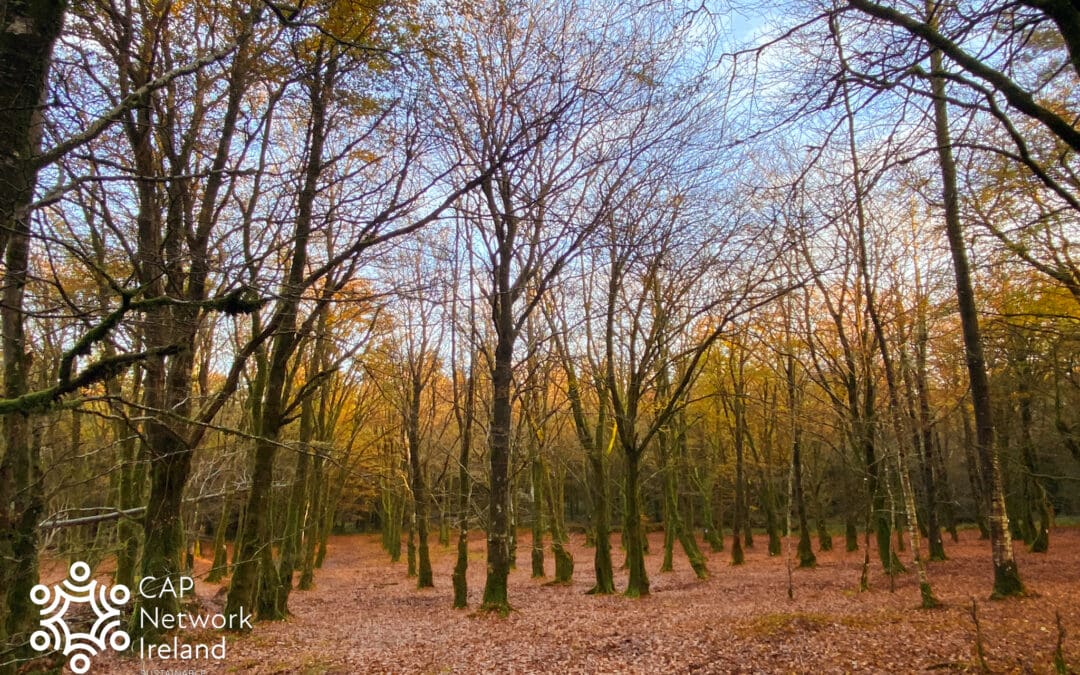Agroforestry Developments in Ireland: Bridging Agriculture, Forestry, and Environment
Agroforestry, the integration of trees into agricultural landscapes has gained significant momentum in Ireland as a sustainable land-use strategy. Combining productive agriculture and trees, it offers a multifunctional approach to enhancing farm productivity while delivering vital ecosystem services. The Irish Agroforestry Forum (IAF) has been supported by the Department of Agriculture, Food, and Marine (DAFM) and the Irish Environmental Network to provide agroforestry education and promotion.
The Role of the Irish Agroforestry Forum
Founded in 2020, the IAF aims to promote agroforestry best practices, drive innovative farmer-led research, and act as a collective voice for stakeholders. Its Advisory Group comprises representatives from government departments, research institutions, environmental organisations, farmers and foresters, fostering collaboration and knowledge exchange. Agroforestry’s environmental, economic, and social benefits are effectively communicated to policymakers, landowners, and the broader public through positive stakeholder engagement and knowledge transfer.
Educational and Promotional Initiatives
Through its Agroforestry Education and Promotion Project, the IAF rolled out a series of targeted activities between December 2023 and October 2024, supported by Forestry Promotion Funding provided by DAFM. These initiatives included:
- Factsheets and Visual Resources: A comprehensive suite of factsheets tailored for various agricultural sectors, such as dairy, poultry, and horticulture, highlighting the benefits of integrating trees into farming systems. These materials offer accessible insights into agroforestry practices.
- Webinars and Training Days: Online events such as member meets and webinars were held throughout the year, covering topics like silvopasture, quality timber production, and the FT8 Agroforestry supports available under the Afforestation Programme 2023 to 2027. IAF also reached out to foresters to provide them with agroforestry information and held regional training days in Leitrim and Waterford providing hands-on guidance on planning and designing agroforestry systems and navigating the grant application process.
- Agroforestry Academy: An online learning platform offering farmer-produced videos, expert-led lectures, and interactive assessments, delivering tailored education on agroforestry was developed. The original online series of E-academy Agroforestry lessons was developed by Van Hall Larenstein (VHL) in the Netherlands and The Institute for Agricultural, Fisheries and Food Research (ILVO) in Flanders, Belgium. Their agroforestry lessons were created for and made possible by the EU project FARMLIFE and the VLAIO project Agroforestry 2025. This content was then adapted for conditions on the island of Ireland and in Great Britain. Currently in its testing phase, the academy will be made available to the public and will be suitable for farmers, foresters and advisors as well as students in second and third-level institutions.
Engaging the Farming Community
A core strategy of the IAF is engaging directly with farmers and showcasing successful agroforestry systems. The Agroforestry Farm Walk Series featured eight farms across Ireland, each demonstrating innovative practices, some examples included
- McInerney’s Farm (Co. Clare): Showcased shelterbelts and ash dieback recovery strategies.
- Killian Varley’s Silvopasture (Co. Galway) Highlighted a diverse tree system integrated with sheep grazing.
- Cooney Family Farm (Co.Cavan): Displayed mixed farming with diversified tree species for enhanced productivity.
These walks provided practical insights into the environmental and economic benefits of agroforestry, including; improved animal welfare, soil health, biodiversity enhancement, carbon sequestration, and improved water quality.
Curriculum Development
The IAF has also been instrumental in embedding agroforestry into Ireland’s educational and policy frameworks. Collaborations with the Society of Irish Foresters, Teagasc, and UCD have advanced efforts to include agroforestry in the Leaving Certificate Agricultural Science and Climate curricula.
Strengthening Stakeholder Collaboration
The IAF places a strong emphasis on meaningful stakeholder engagement, rooted in a deep understanding of the challenges and priorities faced by farmers. Recognising the essential role of farmer livelihoods and the security of farm families, the Forum approaches agroforestry as a collaborative opportunity rather than a directive, giving due credit to farmers for the climate mitigation they are currently undertaking. Acknowledging that trees can be perceived as a risk to farm income due to concerns over forestry land designation and permanent land use changes, the IAF works to help farmers make the best financial decisions through tailored individual farm-specific advice. The Forum provides detailed agroforestry information and integrates guidance on support payment schemes such as the Basic Income Support for Sustainability (BISS), Complementary Redistributive Income Support for Sustainability (CRISS), and other relevant programmes. By highlighting the economic and environmental co-benefits of agroforestry, the IAF builds trust and helps farmers to understand how agroforestry can enhance both farm productivity and resilience.
Policy Development
The Irish Government launched the Afforestation Programme 2023-2027 in November 2023. This programme provides financial support specifically for silvopasture and pilot support for silvoarable and forest gardening. Farmers establishing silvopasture can receive an establishment grant of €8,555 per hectare and an annual premium of €975 per hectare for ten years. These grants can be combined with BISS and Organic Farming Scheme payments for eligible land. By integrating trees into their farming system, farmers can access financial support to boost sustainability, protect biodiversity, and enhance ecosystem services. Please see Agroforestry Supports FT8 Information Booklet. The Forum continues to provide feedback on the uptake of these supports, advocating for policy change where needed based on farmer, advisor and forester experience of navigating the grant application process as well as planning, design and establishment of agroforestry within the requirements of the support measures available.
The Future
Looking ahead, the IAF aims to build on its achievements by expanding farmer-led research, enhancing farmer education, and refining its outreach strategies. Agroforestry in Ireland is at a pivotal stage, blending conventional agriculture with innovation to address what are now urgent global challenges affecting the agricultural industry. Through the efforts of the IAF and its collaborating organisations, Ireland’s farmers are recognising agroforestry’s full potential, as a climate mitigation tool that can also help support production of quality food and timber as well as protection of the environment.
To learn about other innovations in Irish agriculture, click here.




